Analysis of Vodafone's Strategy for Entering International Markets
VerifiedAdded on 2023/01/11
|14
|4574
|56
Report
AI Summary
This report provides a comprehensive analysis of Vodafone's strategy for entering and succeeding in new and international markets, specifically focusing on its potential expansion into Singapore. It begins by defining the global business environment and its impact on small and medium enterprises (S...
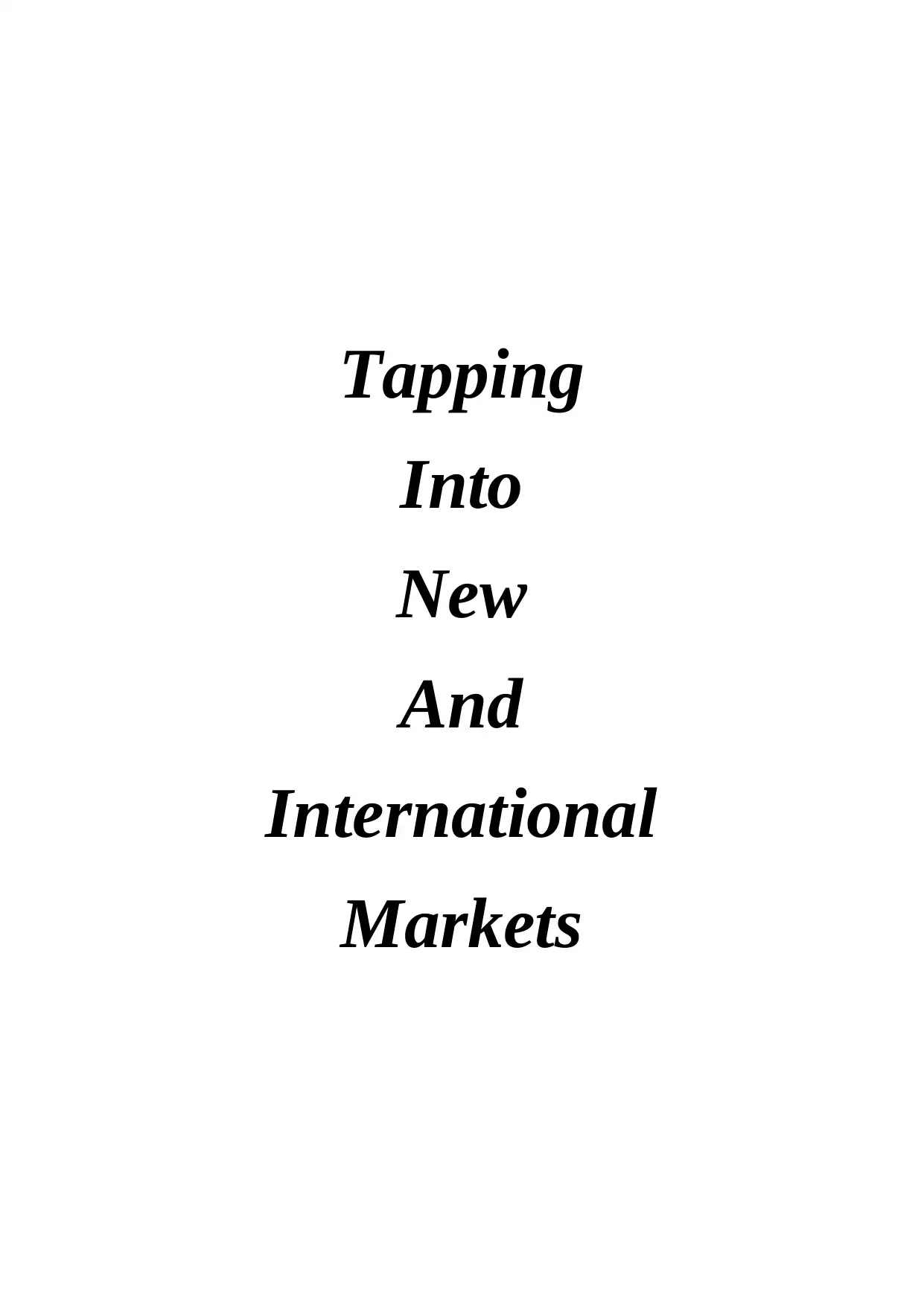
Tapping
Into
New
And
International
Markets
Into
New
And
International
Markets
Paraphrase This Document
Need a fresh take? Get an instant paraphrase of this document with our AI Paraphraser
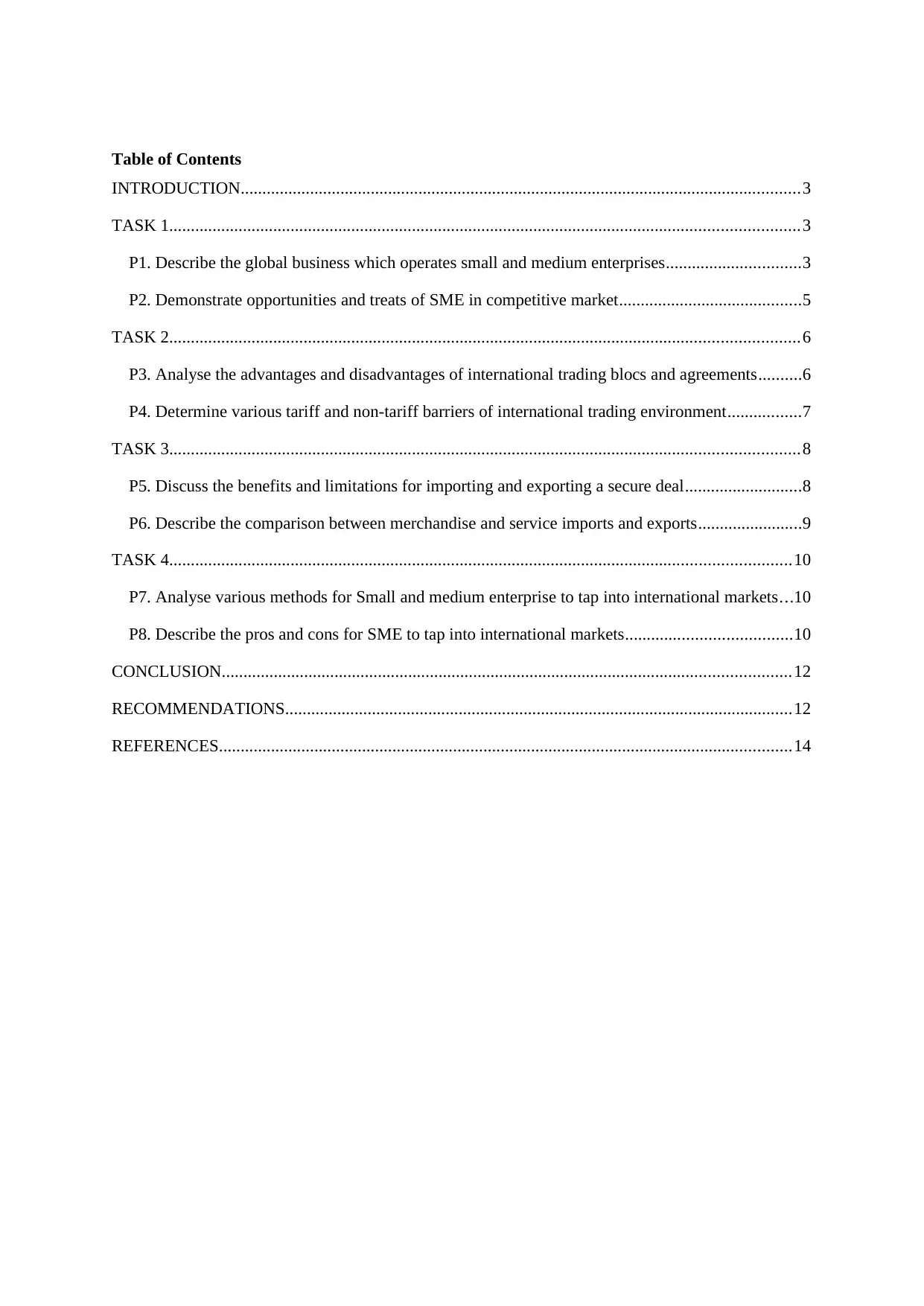
Table of Contents
INTRODUCTION.................................................................................................................................3
TASK 1.................................................................................................................................................3
P1. Describe the global business which operates small and medium enterprises...............................3
P2. Demonstrate opportunities and treats of SME in competitive market..........................................5
TASK 2.................................................................................................................................................6
P3. Analyse the advantages and disadvantages of international trading blocs and agreements..........6
P4. Determine various tariff and non-tariff barriers of international trading environment.................7
TASK 3.................................................................................................................................................8
P5. Discuss the benefits and limitations for importing and exporting a secure deal...........................8
P6. Describe the comparison between merchandise and service imports and exports........................9
TASK 4...............................................................................................................................................10
P7. Analyse various methods for Small and medium enterprise to tap into international markets...10
P8. Describe the pros and cons for SME to tap into international markets......................................10
CONCLUSION...................................................................................................................................12
RECOMMENDATIONS.....................................................................................................................12
REFERENCES....................................................................................................................................14
INTRODUCTION.................................................................................................................................3
TASK 1.................................................................................................................................................3
P1. Describe the global business which operates small and medium enterprises...............................3
P2. Demonstrate opportunities and treats of SME in competitive market..........................................5
TASK 2.................................................................................................................................................6
P3. Analyse the advantages and disadvantages of international trading blocs and agreements..........6
P4. Determine various tariff and non-tariff barriers of international trading environment.................7
TASK 3.................................................................................................................................................8
P5. Discuss the benefits and limitations for importing and exporting a secure deal...........................8
P6. Describe the comparison between merchandise and service imports and exports........................9
TASK 4...............................................................................................................................................10
P7. Analyse various methods for Small and medium enterprise to tap into international markets...10
P8. Describe the pros and cons for SME to tap into international markets......................................10
CONCLUSION...................................................................................................................................12
RECOMMENDATIONS.....................................................................................................................12
REFERENCES....................................................................................................................................14
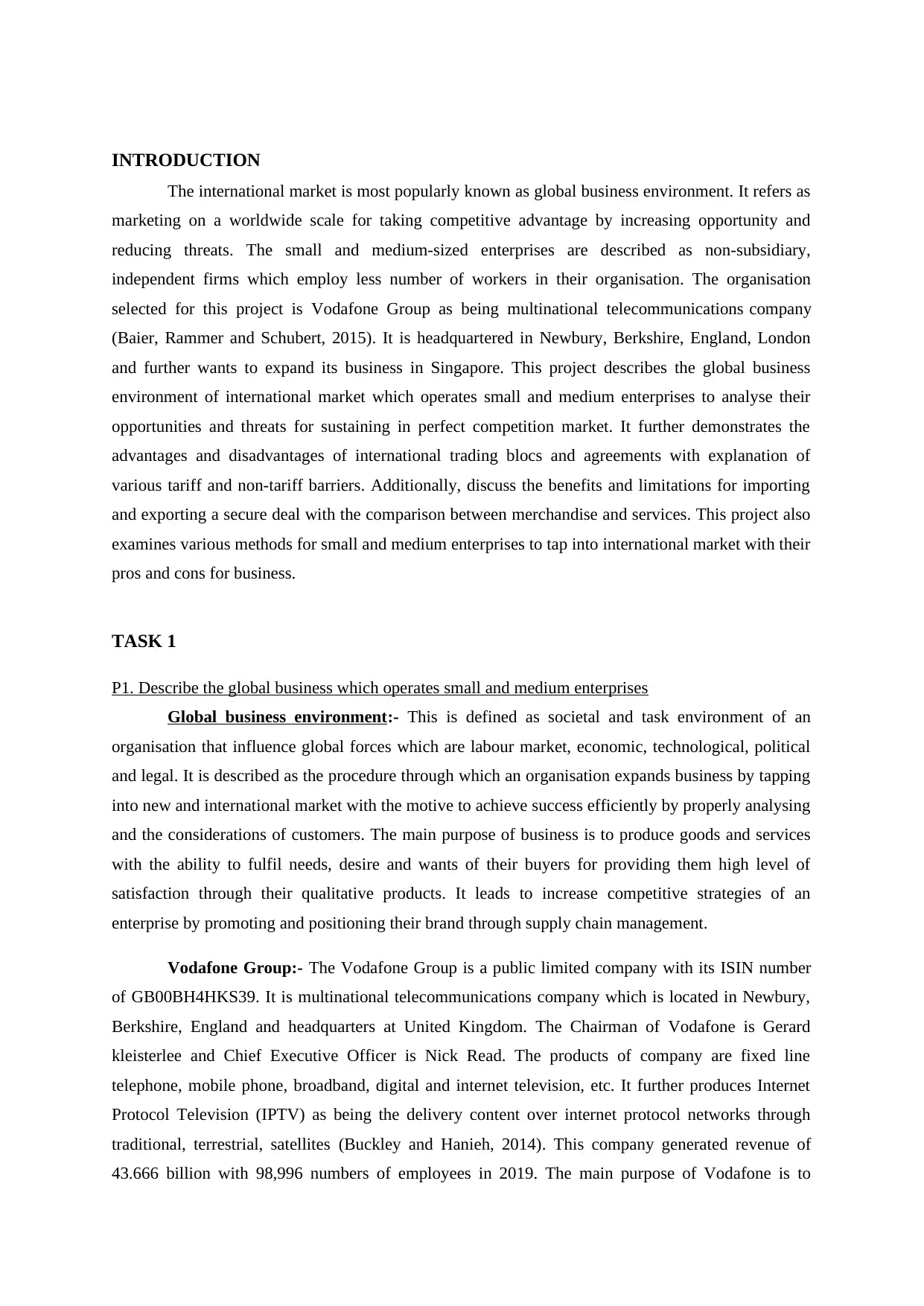
INTRODUCTION
The international market is most popularly known as global business environment. It refers as
marketing on a worldwide scale for taking competitive advantage by increasing opportunity and
reducing threats. The small and medium-sized enterprises are described as non-subsidiary,
independent firms which employ less number of workers in their organisation. The organisation
selected for this project is Vodafone Group as being multinational telecommunications company
(Baier, Rammer and Schubert, 2015). It is headquartered in Newbury, Berkshire, England, London
and further wants to expand its business in Singapore. This project describes the global business
environment of international market which operates small and medium enterprises to analyse their
opportunities and threats for sustaining in perfect competition market. It further demonstrates the
advantages and disadvantages of international trading blocs and agreements with explanation of
various tariff and non-tariff barriers. Additionally, discuss the benefits and limitations for importing
and exporting a secure deal with the comparison between merchandise and services. This project also
examines various methods for small and medium enterprises to tap into international market with their
pros and cons for business.
TASK 1
P1. Describe the global business which operates small and medium enterprises
Global business environment:- This is defined as societal and task environment of an
organisation that influence global forces which are labour market, economic, technological, political
and legal. It is described as the procedure through which an organisation expands business by tapping
into new and international market with the motive to achieve success efficiently by properly analysing
and the considerations of customers. The main purpose of business is to produce goods and services
with the ability to fulfil needs, desire and wants of their buyers for providing them high level of
satisfaction through their qualitative products. It leads to increase competitive strategies of an
enterprise by promoting and positioning their brand through supply chain management.
Vodafone Group:- The Vodafone Group is a public limited company with its ISIN number
of GB00BH4HKS39. It is multinational telecommunications company which is located in Newbury,
Berkshire, England and headquarters at United Kingdom. The Chairman of Vodafone is Gerard
kleisterlee and Chief Executive Officer is Nick Read. The products of company are fixed line
telephone, mobile phone, broadband, digital and internet television, etc. It further produces Internet
Protocol Television (IPTV) as being the delivery content over internet protocol networks through
traditional, terrestrial, satellites (Buckley and Hanieh, 2014). This company generated revenue of
43.666 billion with 98,996 numbers of employees in 2019. The main purpose of Vodafone is to
The international market is most popularly known as global business environment. It refers as
marketing on a worldwide scale for taking competitive advantage by increasing opportunity and
reducing threats. The small and medium-sized enterprises are described as non-subsidiary,
independent firms which employ less number of workers in their organisation. The organisation
selected for this project is Vodafone Group as being multinational telecommunications company
(Baier, Rammer and Schubert, 2015). It is headquartered in Newbury, Berkshire, England, London
and further wants to expand its business in Singapore. This project describes the global business
environment of international market which operates small and medium enterprises to analyse their
opportunities and threats for sustaining in perfect competition market. It further demonstrates the
advantages and disadvantages of international trading blocs and agreements with explanation of
various tariff and non-tariff barriers. Additionally, discuss the benefits and limitations for importing
and exporting a secure deal with the comparison between merchandise and services. This project also
examines various methods for small and medium enterprises to tap into international market with their
pros and cons for business.
TASK 1
P1. Describe the global business which operates small and medium enterprises
Global business environment:- This is defined as societal and task environment of an
organisation that influence global forces which are labour market, economic, technological, political
and legal. It is described as the procedure through which an organisation expands business by tapping
into new and international market with the motive to achieve success efficiently by properly analysing
and the considerations of customers. The main purpose of business is to produce goods and services
with the ability to fulfil needs, desire and wants of their buyers for providing them high level of
satisfaction through their qualitative products. It leads to increase competitive strategies of an
enterprise by promoting and positioning their brand through supply chain management.
Vodafone Group:- The Vodafone Group is a public limited company with its ISIN number
of GB00BH4HKS39. It is multinational telecommunications company which is located in Newbury,
Berkshire, England and headquarters at United Kingdom. The Chairman of Vodafone is Gerard
kleisterlee and Chief Executive Officer is Nick Read. The products of company are fixed line
telephone, mobile phone, broadband, digital and internet television, etc. It further produces Internet
Protocol Television (IPTV) as being the delivery content over internet protocol networks through
traditional, terrestrial, satellites (Buckley and Hanieh, 2014). This company generated revenue of
43.666 billion with 98,996 numbers of employees in 2019. The main purpose of Vodafone is to
⊘ This is a preview!⊘
Do you want full access?
Subscribe today to unlock all pages.

Trusted by 1+ million students worldwide
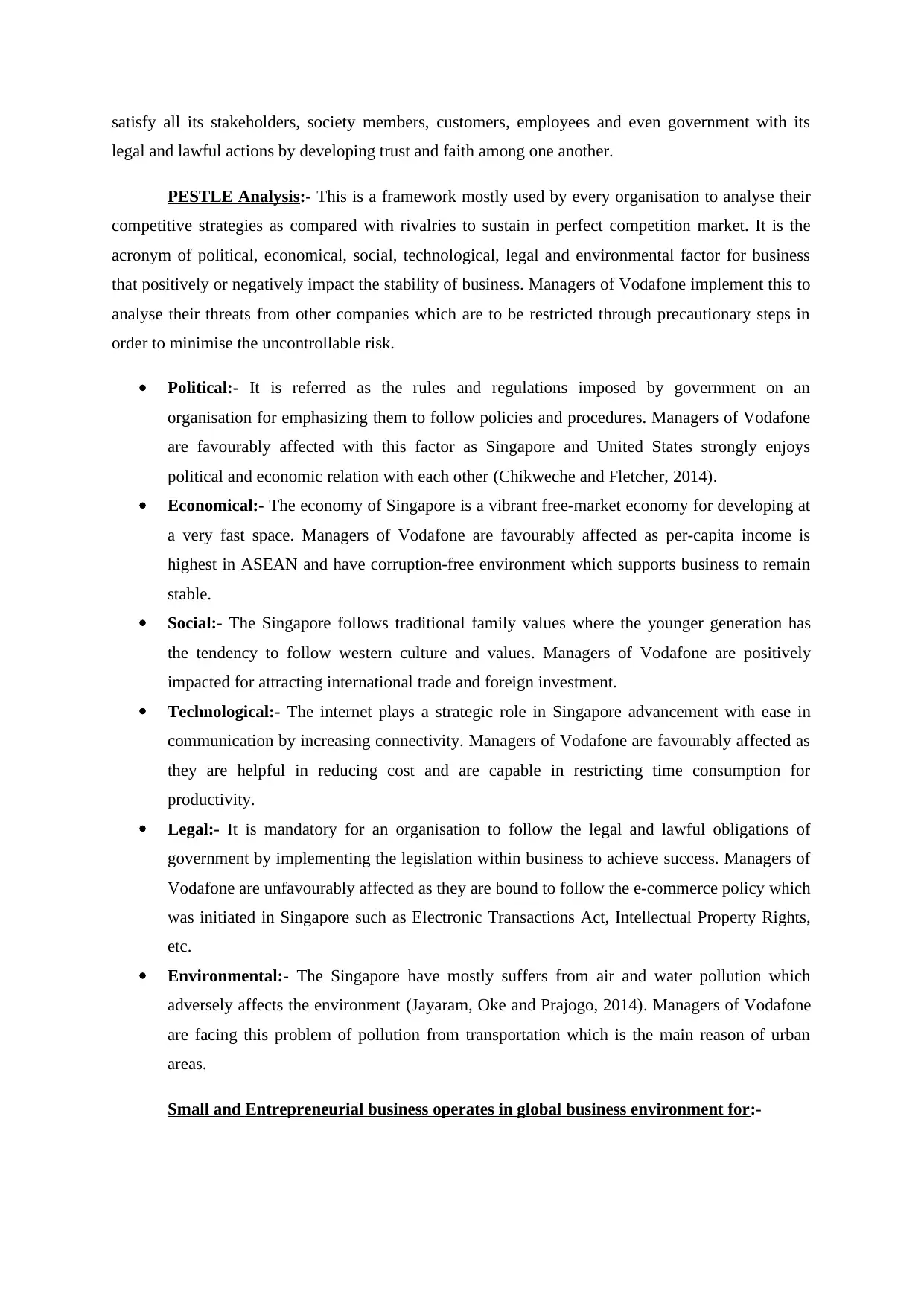
satisfy all its stakeholders, society members, customers, employees and even government with its
legal and lawful actions by developing trust and faith among one another.
PESTLE Analysis:- This is a framework mostly used by every organisation to analyse their
competitive strategies as compared with rivalries to sustain in perfect competition market. It is the
acronym of political, economical, social, technological, legal and environmental factor for business
that positively or negatively impact the stability of business. Managers of Vodafone implement this to
analyse their threats from other companies which are to be restricted through precautionary steps in
order to minimise the uncontrollable risk.
Political:- It is referred as the rules and regulations imposed by government on an
organisation for emphasizing them to follow policies and procedures. Managers of Vodafone
are favourably affected with this factor as Singapore and United States strongly enjoys
political and economic relation with each other (Chikweche and Fletcher, 2014).
Economical:- The economy of Singapore is a vibrant free-market economy for developing at
a very fast space. Managers of Vodafone are favourably affected as per-capita income is
highest in ASEAN and have corruption-free environment which supports business to remain
stable.
Social:- The Singapore follows traditional family values where the younger generation has
the tendency to follow western culture and values. Managers of Vodafone are positively
impacted for attracting international trade and foreign investment.
Technological:- The internet plays a strategic role in Singapore advancement with ease in
communication by increasing connectivity. Managers of Vodafone are favourably affected as
they are helpful in reducing cost and are capable in restricting time consumption for
productivity.
Legal:- It is mandatory for an organisation to follow the legal and lawful obligations of
government by implementing the legislation within business to achieve success. Managers of
Vodafone are unfavourably affected as they are bound to follow the e-commerce policy which
was initiated in Singapore such as Electronic Transactions Act, Intellectual Property Rights,
etc.
Environmental:- The Singapore have mostly suffers from air and water pollution which
adversely affects the environment (Jayaram, Oke and Prajogo, 2014). Managers of Vodafone
are facing this problem of pollution from transportation which is the main reason of urban
areas.
Small and Entrepreneurial business operates in global business environment for:-
legal and lawful actions by developing trust and faith among one another.
PESTLE Analysis:- This is a framework mostly used by every organisation to analyse their
competitive strategies as compared with rivalries to sustain in perfect competition market. It is the
acronym of political, economical, social, technological, legal and environmental factor for business
that positively or negatively impact the stability of business. Managers of Vodafone implement this to
analyse their threats from other companies which are to be restricted through precautionary steps in
order to minimise the uncontrollable risk.
Political:- It is referred as the rules and regulations imposed by government on an
organisation for emphasizing them to follow policies and procedures. Managers of Vodafone
are favourably affected with this factor as Singapore and United States strongly enjoys
political and economic relation with each other (Chikweche and Fletcher, 2014).
Economical:- The economy of Singapore is a vibrant free-market economy for developing at
a very fast space. Managers of Vodafone are favourably affected as per-capita income is
highest in ASEAN and have corruption-free environment which supports business to remain
stable.
Social:- The Singapore follows traditional family values where the younger generation has
the tendency to follow western culture and values. Managers of Vodafone are positively
impacted for attracting international trade and foreign investment.
Technological:- The internet plays a strategic role in Singapore advancement with ease in
communication by increasing connectivity. Managers of Vodafone are favourably affected as
they are helpful in reducing cost and are capable in restricting time consumption for
productivity.
Legal:- It is mandatory for an organisation to follow the legal and lawful obligations of
government by implementing the legislation within business to achieve success. Managers of
Vodafone are unfavourably affected as they are bound to follow the e-commerce policy which
was initiated in Singapore such as Electronic Transactions Act, Intellectual Property Rights,
etc.
Environmental:- The Singapore have mostly suffers from air and water pollution which
adversely affects the environment (Jayaram, Oke and Prajogo, 2014). Managers of Vodafone
are facing this problem of pollution from transportation which is the main reason of urban
areas.
Small and Entrepreneurial business operates in global business environment for:-
Paraphrase This Document
Need a fresh take? Get an instant paraphrase of this document with our AI Paraphraser
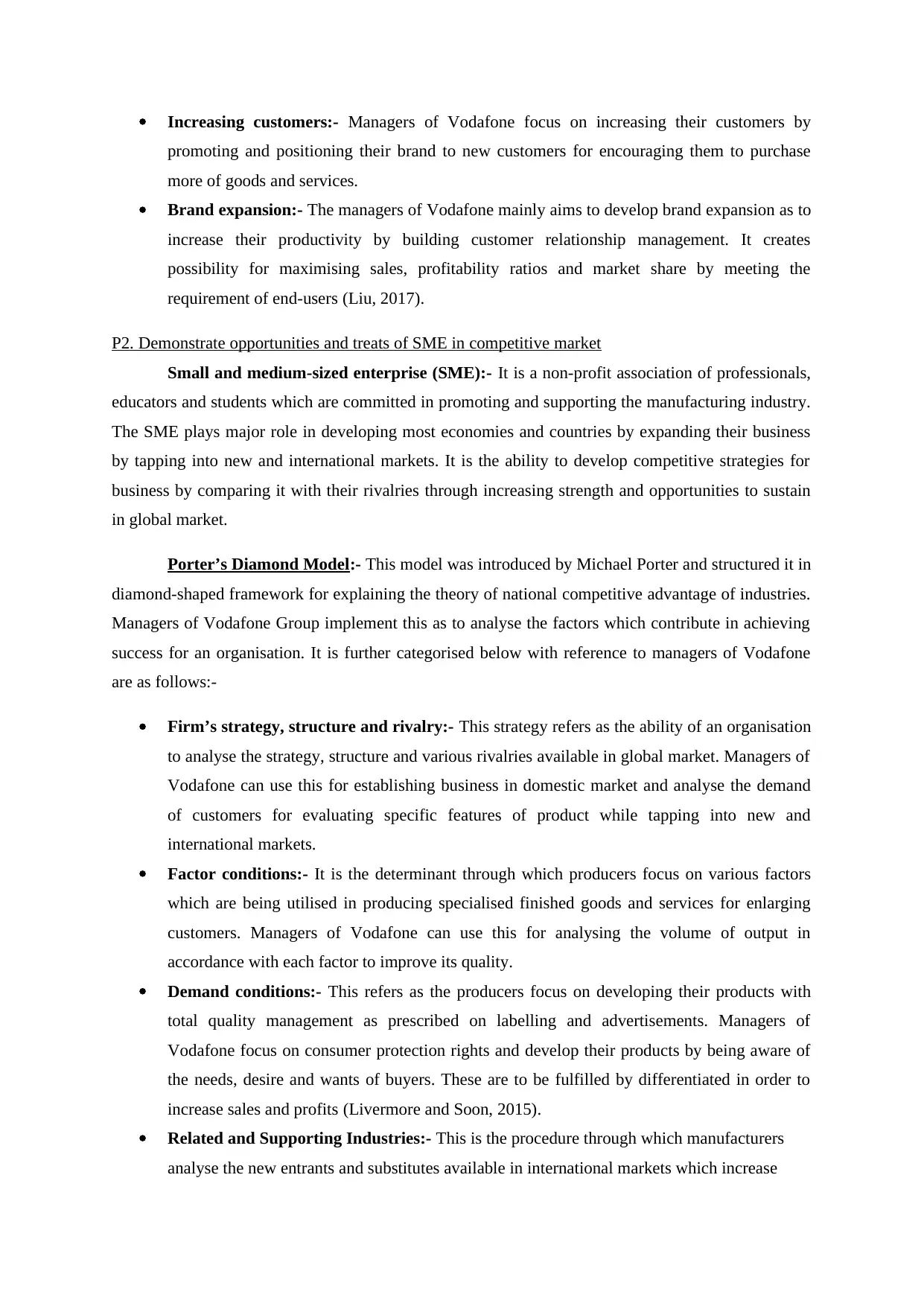
Increasing customers:- Managers of Vodafone focus on increasing their customers by
promoting and positioning their brand to new customers for encouraging them to purchase
more of goods and services.
Brand expansion:- The managers of Vodafone mainly aims to develop brand expansion as to
increase their productivity by building customer relationship management. It creates
possibility for maximising sales, profitability ratios and market share by meeting the
requirement of end-users (Liu, 2017).
P2. Demonstrate opportunities and treats of SME in competitive market
Small and medium-sized enterprise (SME):- It is a non-profit association of professionals,
educators and students which are committed in promoting and supporting the manufacturing industry.
The SME plays major role in developing most economies and countries by expanding their business
by tapping into new and international markets. It is the ability to develop competitive strategies for
business by comparing it with their rivalries through increasing strength and opportunities to sustain
in global market.
Porter’s Diamond Model:- This model was introduced by Michael Porter and structured it in
diamond-shaped framework for explaining the theory of national competitive advantage of industries.
Managers of Vodafone Group implement this as to analyse the factors which contribute in achieving
success for an organisation. It is further categorised below with reference to managers of Vodafone
are as follows:-
Firm’s strategy, structure and rivalry:- This strategy refers as the ability of an organisation
to analyse the strategy, structure and various rivalries available in global market. Managers of
Vodafone can use this for establishing business in domestic market and analyse the demand
of customers for evaluating specific features of product while tapping into new and
international markets.
Factor conditions:- It is the determinant through which producers focus on various factors
which are being utilised in producing specialised finished goods and services for enlarging
customers. Managers of Vodafone can use this for analysing the volume of output in
accordance with each factor to improve its quality.
Demand conditions:- This refers as the producers focus on developing their products with
total quality management as prescribed on labelling and advertisements. Managers of
Vodafone focus on consumer protection rights and develop their products by being aware of
the needs, desire and wants of buyers. These are to be fulfilled by differentiated in order to
increase sales and profits (Livermore and Soon, 2015).
Related and Supporting Industries:- This is the procedure through which manufacturers
analyse the new entrants and substitutes available in international markets which increase
promoting and positioning their brand to new customers for encouraging them to purchase
more of goods and services.
Brand expansion:- The managers of Vodafone mainly aims to develop brand expansion as to
increase their productivity by building customer relationship management. It creates
possibility for maximising sales, profitability ratios and market share by meeting the
requirement of end-users (Liu, 2017).
P2. Demonstrate opportunities and treats of SME in competitive market
Small and medium-sized enterprise (SME):- It is a non-profit association of professionals,
educators and students which are committed in promoting and supporting the manufacturing industry.
The SME plays major role in developing most economies and countries by expanding their business
by tapping into new and international markets. It is the ability to develop competitive strategies for
business by comparing it with their rivalries through increasing strength and opportunities to sustain
in global market.
Porter’s Diamond Model:- This model was introduced by Michael Porter and structured it in
diamond-shaped framework for explaining the theory of national competitive advantage of industries.
Managers of Vodafone Group implement this as to analyse the factors which contribute in achieving
success for an organisation. It is further categorised below with reference to managers of Vodafone
are as follows:-
Firm’s strategy, structure and rivalry:- This strategy refers as the ability of an organisation
to analyse the strategy, structure and various rivalries available in global market. Managers of
Vodafone can use this for establishing business in domestic market and analyse the demand
of customers for evaluating specific features of product while tapping into new and
international markets.
Factor conditions:- It is the determinant through which producers focus on various factors
which are being utilised in producing specialised finished goods and services for enlarging
customers. Managers of Vodafone can use this for analysing the volume of output in
accordance with each factor to improve its quality.
Demand conditions:- This refers as the producers focus on developing their products with
total quality management as prescribed on labelling and advertisements. Managers of
Vodafone focus on consumer protection rights and develop their products by being aware of
the needs, desire and wants of buyers. These are to be fulfilled by differentiated in order to
increase sales and profits (Livermore and Soon, 2015).
Related and Supporting Industries:- This is the procedure through which manufacturers
analyse the new entrants and substitutes available in international markets which increase
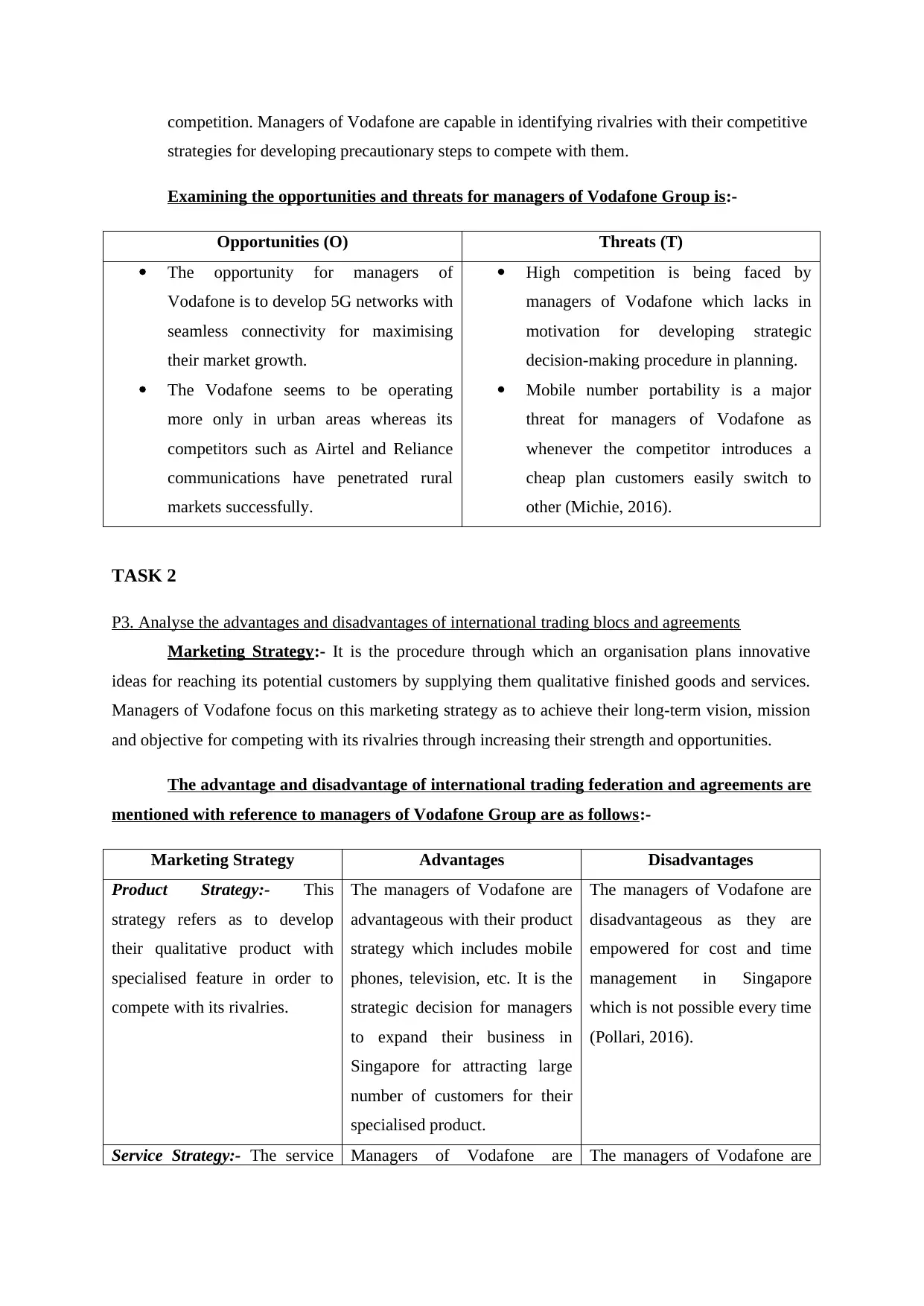
competition. Managers of Vodafone are capable in identifying rivalries with their competitive
strategies for developing precautionary steps to compete with them.
Examining the opportunities and threats for managers of Vodafone Group is:-
Opportunities (O) Threats (T)
The opportunity for managers of
Vodafone is to develop 5G networks with
seamless connectivity for maximising
their market growth.
The Vodafone seems to be operating
more only in urban areas whereas its
competitors such as Airtel and Reliance
communications have penetrated rural
markets successfully.
High competition is being faced by
managers of Vodafone which lacks in
motivation for developing strategic
decision-making procedure in planning.
Mobile number portability is a major
threat for managers of Vodafone as
whenever the competitor introduces a
cheap plan customers easily switch to
other (Michie, 2016).
TASK 2
P3. Analyse the advantages and disadvantages of international trading blocs and agreements
Marketing Strategy:- It is the procedure through which an organisation plans innovative
ideas for reaching its potential customers by supplying them qualitative finished goods and services.
Managers of Vodafone focus on this marketing strategy as to achieve their long-term vision, mission
and objective for competing with its rivalries through increasing their strength and opportunities.
The advantage and disadvantage of international trading federation and agreements are
mentioned with reference to managers of Vodafone Group are as follows:-
Marketing Strategy Advantages Disadvantages
Product Strategy:- This
strategy refers as to develop
their qualitative product with
specialised feature in order to
compete with its rivalries.
The managers of Vodafone are
advantageous with their product
strategy which includes mobile
phones, television, etc. It is the
strategic decision for managers
to expand their business in
Singapore for attracting large
number of customers for their
specialised product.
The managers of Vodafone are
disadvantageous as they are
empowered for cost and time
management in Singapore
which is not possible every time
(Pollari, 2016).
Service Strategy:- The service Managers of Vodafone are The managers of Vodafone are
strategies for developing precautionary steps to compete with them.
Examining the opportunities and threats for managers of Vodafone Group is:-
Opportunities (O) Threats (T)
The opportunity for managers of
Vodafone is to develop 5G networks with
seamless connectivity for maximising
their market growth.
The Vodafone seems to be operating
more only in urban areas whereas its
competitors such as Airtel and Reliance
communications have penetrated rural
markets successfully.
High competition is being faced by
managers of Vodafone which lacks in
motivation for developing strategic
decision-making procedure in planning.
Mobile number portability is a major
threat for managers of Vodafone as
whenever the competitor introduces a
cheap plan customers easily switch to
other (Michie, 2016).
TASK 2
P3. Analyse the advantages and disadvantages of international trading blocs and agreements
Marketing Strategy:- It is the procedure through which an organisation plans innovative
ideas for reaching its potential customers by supplying them qualitative finished goods and services.
Managers of Vodafone focus on this marketing strategy as to achieve their long-term vision, mission
and objective for competing with its rivalries through increasing their strength and opportunities.
The advantage and disadvantage of international trading federation and agreements are
mentioned with reference to managers of Vodafone Group are as follows:-
Marketing Strategy Advantages Disadvantages
Product Strategy:- This
strategy refers as to develop
their qualitative product with
specialised feature in order to
compete with its rivalries.
The managers of Vodafone are
advantageous with their product
strategy which includes mobile
phones, television, etc. It is the
strategic decision for managers
to expand their business in
Singapore for attracting large
number of customers for their
specialised product.
The managers of Vodafone are
disadvantageous as they are
empowered for cost and time
management in Singapore
which is not possible every time
(Pollari, 2016).
Service Strategy:- The service Managers of Vodafone are The managers of Vodafone are
⊘ This is a preview!⊘
Do you want full access?
Subscribe today to unlock all pages.

Trusted by 1+ million students worldwide
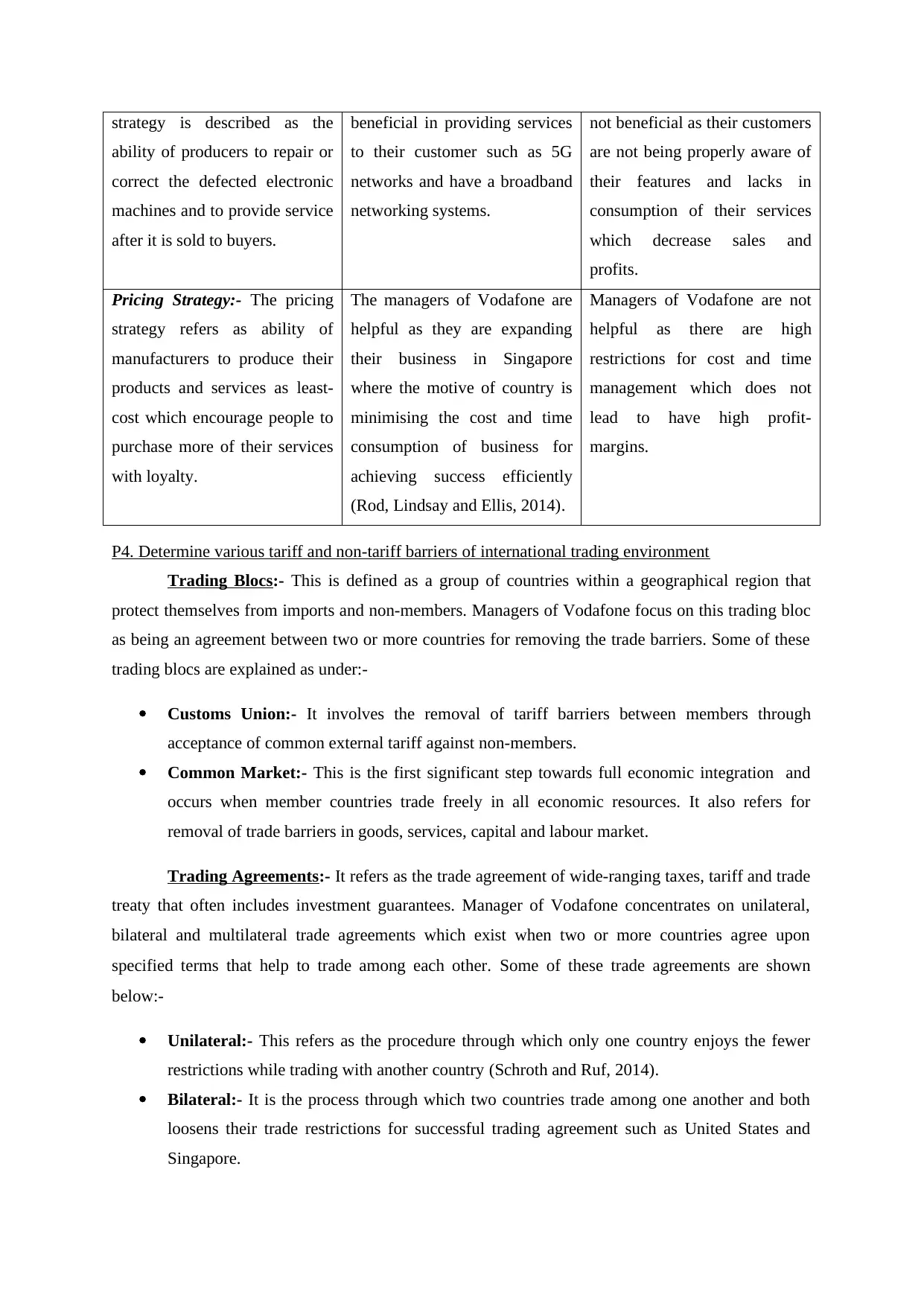
strategy is described as the
ability of producers to repair or
correct the defected electronic
machines and to provide service
after it is sold to buyers.
beneficial in providing services
to their customer such as 5G
networks and have a broadband
networking systems.
not beneficial as their customers
are not being properly aware of
their features and lacks in
consumption of their services
which decrease sales and
profits.
Pricing Strategy:- The pricing
strategy refers as ability of
manufacturers to produce their
products and services as least-
cost which encourage people to
purchase more of their services
with loyalty.
The managers of Vodafone are
helpful as they are expanding
their business in Singapore
where the motive of country is
minimising the cost and time
consumption of business for
achieving success efficiently
(Rod, Lindsay and Ellis, 2014).
Managers of Vodafone are not
helpful as there are high
restrictions for cost and time
management which does not
lead to have high profit-
margins.
P4. Determine various tariff and non-tariff barriers of international trading environment
Trading Blocs:- This is defined as a group of countries within a geographical region that
protect themselves from imports and non-members. Managers of Vodafone focus on this trading bloc
as being an agreement between two or more countries for removing the trade barriers. Some of these
trading blocs are explained as under:-
Customs Union:- It involves the removal of tariff barriers between members through
acceptance of common external tariff against non-members.
Common Market:- This is the first significant step towards full economic integration and
occurs when member countries trade freely in all economic resources. It also refers for
removal of trade barriers in goods, services, capital and labour market.
Trading Agreements:- It refers as the trade agreement of wide-ranging taxes, tariff and trade
treaty that often includes investment guarantees. Manager of Vodafone concentrates on unilateral,
bilateral and multilateral trade agreements which exist when two or more countries agree upon
specified terms that help to trade among each other. Some of these trade agreements are shown
below:-
Unilateral:- This refers as the procedure through which only one country enjoys the fewer
restrictions while trading with another country (Schroth and Ruf, 2014).
Bilateral:- It is the process through which two countries trade among one another and both
loosens their trade restrictions for successful trading agreement such as United States and
Singapore.
ability of producers to repair or
correct the defected electronic
machines and to provide service
after it is sold to buyers.
beneficial in providing services
to their customer such as 5G
networks and have a broadband
networking systems.
not beneficial as their customers
are not being properly aware of
their features and lacks in
consumption of their services
which decrease sales and
profits.
Pricing Strategy:- The pricing
strategy refers as ability of
manufacturers to produce their
products and services as least-
cost which encourage people to
purchase more of their services
with loyalty.
The managers of Vodafone are
helpful as they are expanding
their business in Singapore
where the motive of country is
minimising the cost and time
consumption of business for
achieving success efficiently
(Rod, Lindsay and Ellis, 2014).
Managers of Vodafone are not
helpful as there are high
restrictions for cost and time
management which does not
lead to have high profit-
margins.
P4. Determine various tariff and non-tariff barriers of international trading environment
Trading Blocs:- This is defined as a group of countries within a geographical region that
protect themselves from imports and non-members. Managers of Vodafone focus on this trading bloc
as being an agreement between two or more countries for removing the trade barriers. Some of these
trading blocs are explained as under:-
Customs Union:- It involves the removal of tariff barriers between members through
acceptance of common external tariff against non-members.
Common Market:- This is the first significant step towards full economic integration and
occurs when member countries trade freely in all economic resources. It also refers for
removal of trade barriers in goods, services, capital and labour market.
Trading Agreements:- It refers as the trade agreement of wide-ranging taxes, tariff and trade
treaty that often includes investment guarantees. Manager of Vodafone concentrates on unilateral,
bilateral and multilateral trade agreements which exist when two or more countries agree upon
specified terms that help to trade among each other. Some of these trade agreements are shown
below:-
Unilateral:- This refers as the procedure through which only one country enjoys the fewer
restrictions while trading with another country (Schroth and Ruf, 2014).
Bilateral:- It is the process through which two countries trade among one another and both
loosens their trade restrictions for successful trading agreement such as United States and
Singapore.
Paraphrase This Document
Need a fresh take? Get an instant paraphrase of this document with our AI Paraphraser
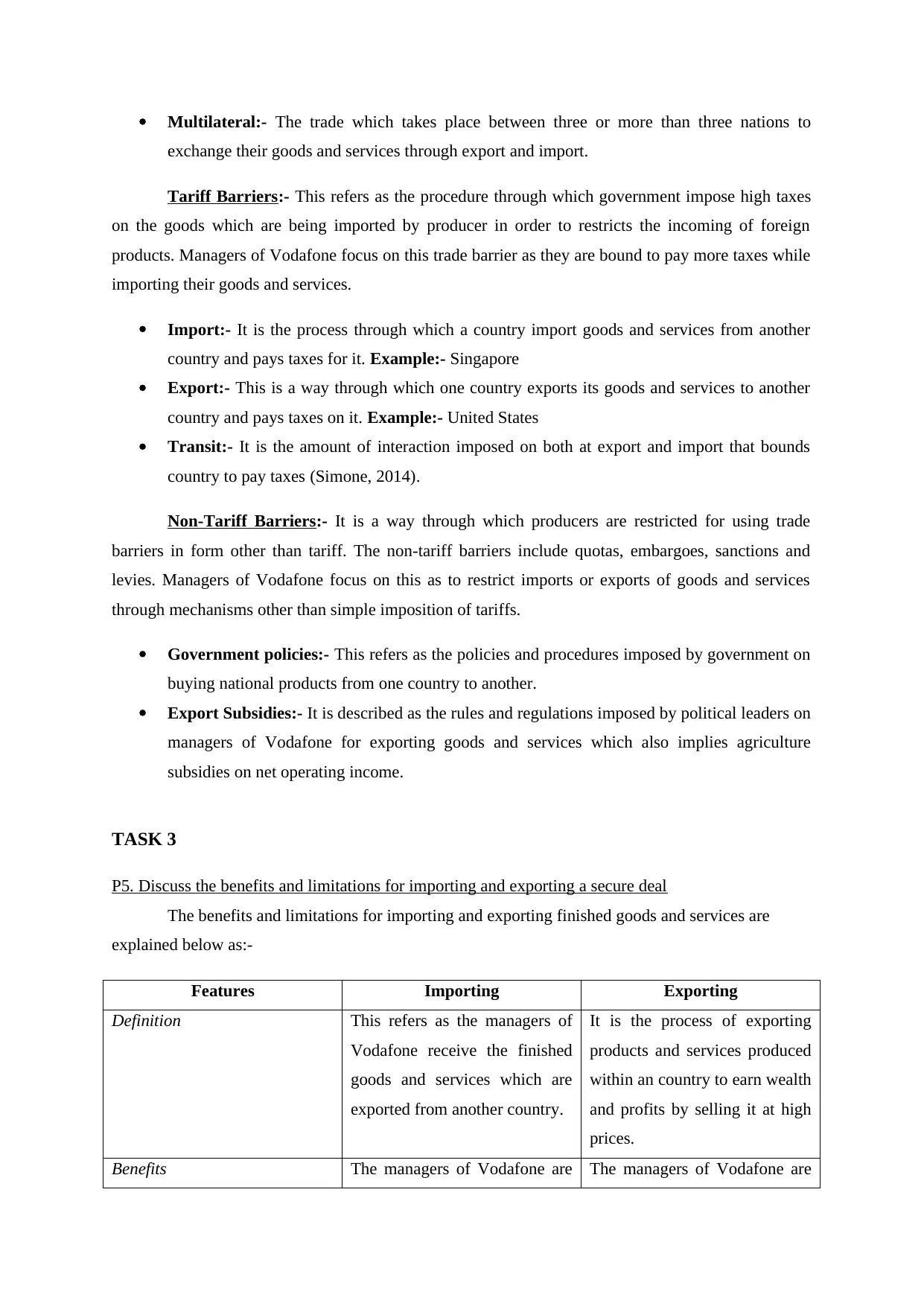
Multilateral:- The trade which takes place between three or more than three nations to
exchange their goods and services through export and import.
Tariff Barriers:- This refers as the procedure through which government impose high taxes
on the goods which are being imported by producer in order to restricts the incoming of foreign
products. Managers of Vodafone focus on this trade barrier as they are bound to pay more taxes while
importing their goods and services.
Import:- It is the process through which a country import goods and services from another
country and pays taxes for it. Example:- Singapore
Export:- This is a way through which one country exports its goods and services to another
country and pays taxes on it. Example:- United States
Transit:- It is the amount of interaction imposed on both at export and import that bounds
country to pay taxes (Simone, 2014).
Non-Tariff Barriers:- It is a way through which producers are restricted for using trade
barriers in form other than tariff. The non-tariff barriers include quotas, embargoes, sanctions and
levies. Managers of Vodafone focus on this as to restrict imports or exports of goods and services
through mechanisms other than simple imposition of tariffs.
Government policies:- This refers as the policies and procedures imposed by government on
buying national products from one country to another.
Export Subsidies:- It is described as the rules and regulations imposed by political leaders on
managers of Vodafone for exporting goods and services which also implies agriculture
subsidies on net operating income.
TASK 3
P5. Discuss the benefits and limitations for importing and exporting a secure deal
The benefits and limitations for importing and exporting finished goods and services are
explained below as:-
Features Importing Exporting
Definition This refers as the managers of
Vodafone receive the finished
goods and services which are
exported from another country.
It is the process of exporting
products and services produced
within an country to earn wealth
and profits by selling it at high
prices.
Benefits The managers of Vodafone are The managers of Vodafone are
exchange their goods and services through export and import.
Tariff Barriers:- This refers as the procedure through which government impose high taxes
on the goods which are being imported by producer in order to restricts the incoming of foreign
products. Managers of Vodafone focus on this trade barrier as they are bound to pay more taxes while
importing their goods and services.
Import:- It is the process through which a country import goods and services from another
country and pays taxes for it. Example:- Singapore
Export:- This is a way through which one country exports its goods and services to another
country and pays taxes on it. Example:- United States
Transit:- It is the amount of interaction imposed on both at export and import that bounds
country to pay taxes (Simone, 2014).
Non-Tariff Barriers:- It is a way through which producers are restricted for using trade
barriers in form other than tariff. The non-tariff barriers include quotas, embargoes, sanctions and
levies. Managers of Vodafone focus on this as to restrict imports or exports of goods and services
through mechanisms other than simple imposition of tariffs.
Government policies:- This refers as the policies and procedures imposed by government on
buying national products from one country to another.
Export Subsidies:- It is described as the rules and regulations imposed by political leaders on
managers of Vodafone for exporting goods and services which also implies agriculture
subsidies on net operating income.
TASK 3
P5. Discuss the benefits and limitations for importing and exporting a secure deal
The benefits and limitations for importing and exporting finished goods and services are
explained below as:-
Features Importing Exporting
Definition This refers as the managers of
Vodafone receive the finished
goods and services which are
exported from another country.
It is the process of exporting
products and services produced
within an country to earn wealth
and profits by selling it at high
prices.
Benefits The managers of Vodafone are The managers of Vodafone are
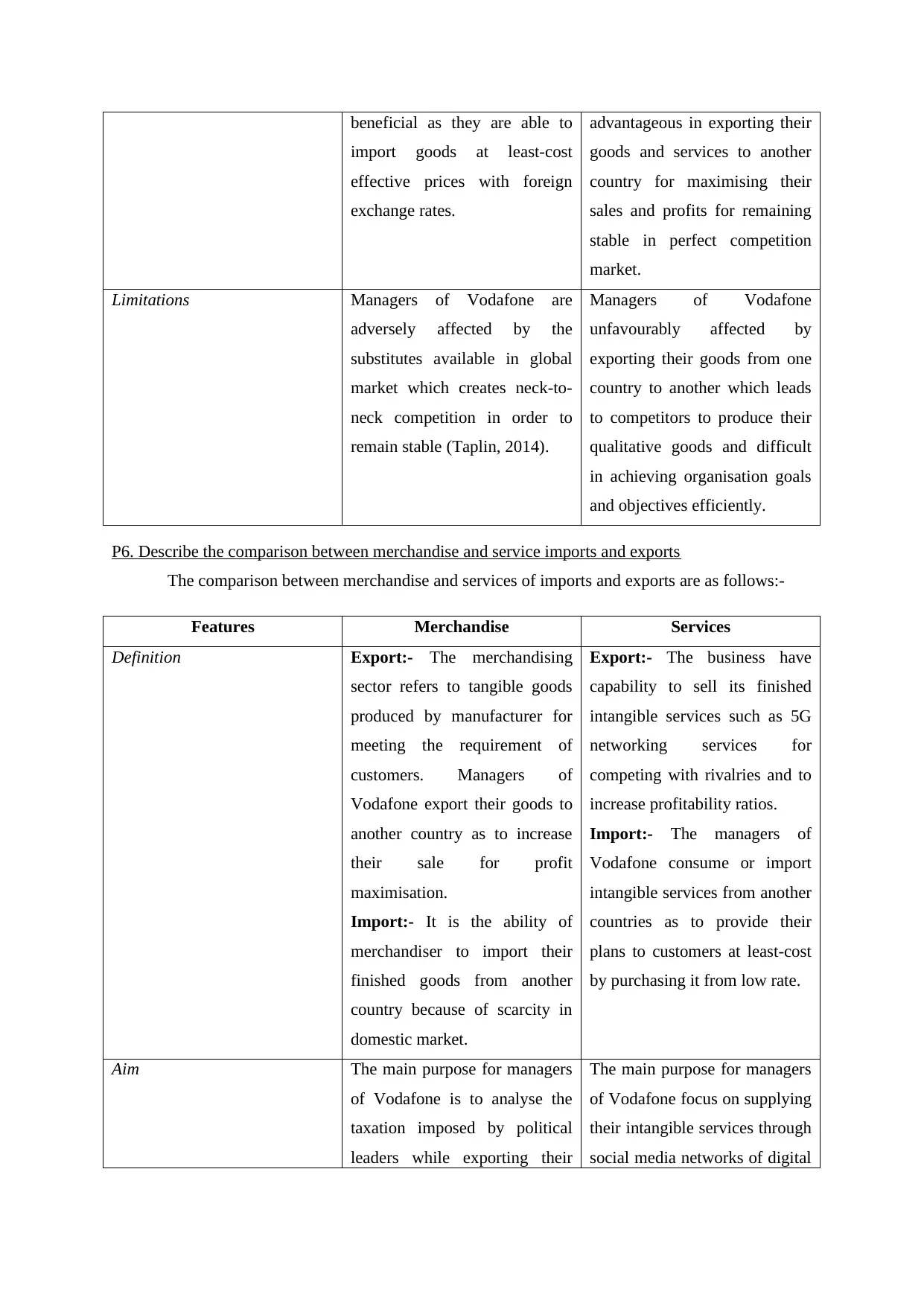
beneficial as they are able to
import goods at least-cost
effective prices with foreign
exchange rates.
advantageous in exporting their
goods and services to another
country for maximising their
sales and profits for remaining
stable in perfect competition
market.
Limitations Managers of Vodafone are
adversely affected by the
substitutes available in global
market which creates neck-to-
neck competition in order to
remain stable (Taplin, 2014).
Managers of Vodafone
unfavourably affected by
exporting their goods from one
country to another which leads
to competitors to produce their
qualitative goods and difficult
in achieving organisation goals
and objectives efficiently.
P6. Describe the comparison between merchandise and service imports and exports
The comparison between merchandise and services of imports and exports are as follows:-
Features Merchandise Services
Definition Export:- The merchandising
sector refers to tangible goods
produced by manufacturer for
meeting the requirement of
customers. Managers of
Vodafone export their goods to
another country as to increase
their sale for profit
maximisation.
Import:- It is the ability of
merchandiser to import their
finished goods from another
country because of scarcity in
domestic market.
Export:- The business have
capability to sell its finished
intangible services such as 5G
networking services for
competing with rivalries and to
increase profitability ratios.
Import:- The managers of
Vodafone consume or import
intangible services from another
countries as to provide their
plans to customers at least-cost
by purchasing it from low rate.
Aim The main purpose for managers
of Vodafone is to analyse the
taxation imposed by political
leaders while exporting their
The main purpose for managers
of Vodafone focus on supplying
their intangible services through
social media networks of digital
import goods at least-cost
effective prices with foreign
exchange rates.
advantageous in exporting their
goods and services to another
country for maximising their
sales and profits for remaining
stable in perfect competition
market.
Limitations Managers of Vodafone are
adversely affected by the
substitutes available in global
market which creates neck-to-
neck competition in order to
remain stable (Taplin, 2014).
Managers of Vodafone
unfavourably affected by
exporting their goods from one
country to another which leads
to competitors to produce their
qualitative goods and difficult
in achieving organisation goals
and objectives efficiently.
P6. Describe the comparison between merchandise and service imports and exports
The comparison between merchandise and services of imports and exports are as follows:-
Features Merchandise Services
Definition Export:- The merchandising
sector refers to tangible goods
produced by manufacturer for
meeting the requirement of
customers. Managers of
Vodafone export their goods to
another country as to increase
their sale for profit
maximisation.
Import:- It is the ability of
merchandiser to import their
finished goods from another
country because of scarcity in
domestic market.
Export:- The business have
capability to sell its finished
intangible services such as 5G
networking services for
competing with rivalries and to
increase profitability ratios.
Import:- The managers of
Vodafone consume or import
intangible services from another
countries as to provide their
plans to customers at least-cost
by purchasing it from low rate.
Aim The main purpose for managers
of Vodafone is to analyse the
taxation imposed by political
leaders while exporting their
The main purpose for managers
of Vodafone focus on supplying
their intangible services through
social media networks of digital
⊘ This is a preview!⊘
Do you want full access?
Subscribe today to unlock all pages.

Trusted by 1+ million students worldwide
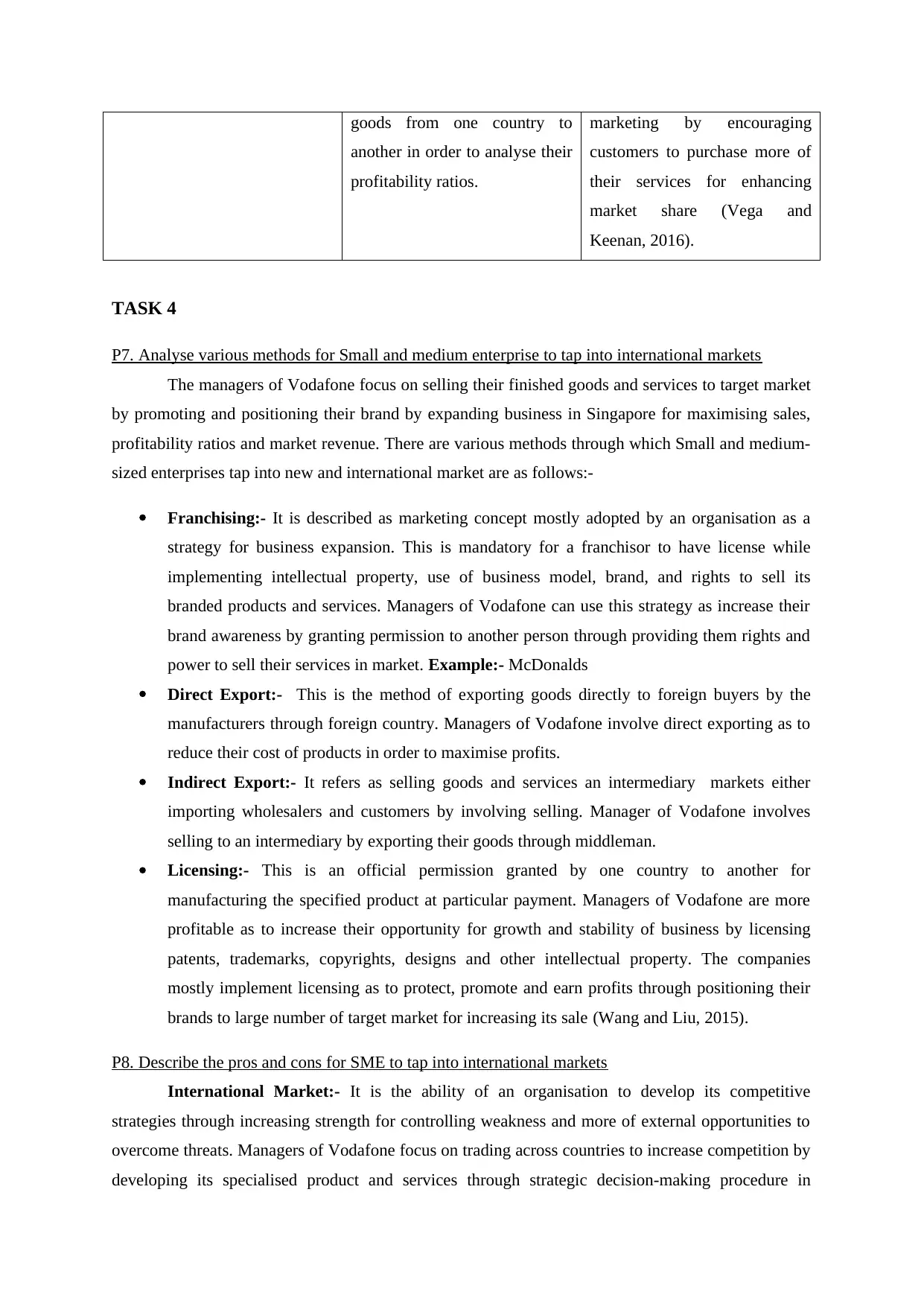
goods from one country to
another in order to analyse their
profitability ratios.
marketing by encouraging
customers to purchase more of
their services for enhancing
market share (Vega and
Keenan, 2016).
TASK 4
P7. Analyse various methods for Small and medium enterprise to tap into international markets
The managers of Vodafone focus on selling their finished goods and services to target market
by promoting and positioning their brand by expanding business in Singapore for maximising sales,
profitability ratios and market revenue. There are various methods through which Small and medium-
sized enterprises tap into new and international market are as follows:-
Franchising:- It is described as marketing concept mostly adopted by an organisation as a
strategy for business expansion. This is mandatory for a franchisor to have license while
implementing intellectual property, use of business model, brand, and rights to sell its
branded products and services. Managers of Vodafone can use this strategy as increase their
brand awareness by granting permission to another person through providing them rights and
power to sell their services in market. Example:- McDonalds
Direct Export:- This is the method of exporting goods directly to foreign buyers by the
manufacturers through foreign country. Managers of Vodafone involve direct exporting as to
reduce their cost of products in order to maximise profits.
Indirect Export:- It refers as selling goods and services an intermediary markets either
importing wholesalers and customers by involving selling. Manager of Vodafone involves
selling to an intermediary by exporting their goods through middleman.
Licensing:- This is an official permission granted by one country to another for
manufacturing the specified product at particular payment. Managers of Vodafone are more
profitable as to increase their opportunity for growth and stability of business by licensing
patents, trademarks, copyrights, designs and other intellectual property. The companies
mostly implement licensing as to protect, promote and earn profits through positioning their
brands to large number of target market for increasing its sale (Wang and Liu, 2015).
P8. Describe the pros and cons for SME to tap into international markets
International Market:- It is the ability of an organisation to develop its competitive
strategies through increasing strength for controlling weakness and more of external opportunities to
overcome threats. Managers of Vodafone focus on trading across countries to increase competition by
developing its specialised product and services through strategic decision-making procedure in
another in order to analyse their
profitability ratios.
marketing by encouraging
customers to purchase more of
their services for enhancing
market share (Vega and
Keenan, 2016).
TASK 4
P7. Analyse various methods for Small and medium enterprise to tap into international markets
The managers of Vodafone focus on selling their finished goods and services to target market
by promoting and positioning their brand by expanding business in Singapore for maximising sales,
profitability ratios and market revenue. There are various methods through which Small and medium-
sized enterprises tap into new and international market are as follows:-
Franchising:- It is described as marketing concept mostly adopted by an organisation as a
strategy for business expansion. This is mandatory for a franchisor to have license while
implementing intellectual property, use of business model, brand, and rights to sell its
branded products and services. Managers of Vodafone can use this strategy as increase their
brand awareness by granting permission to another person through providing them rights and
power to sell their services in market. Example:- McDonalds
Direct Export:- This is the method of exporting goods directly to foreign buyers by the
manufacturers through foreign country. Managers of Vodafone involve direct exporting as to
reduce their cost of products in order to maximise profits.
Indirect Export:- It refers as selling goods and services an intermediary markets either
importing wholesalers and customers by involving selling. Manager of Vodafone involves
selling to an intermediary by exporting their goods through middleman.
Licensing:- This is an official permission granted by one country to another for
manufacturing the specified product at particular payment. Managers of Vodafone are more
profitable as to increase their opportunity for growth and stability of business by licensing
patents, trademarks, copyrights, designs and other intellectual property. The companies
mostly implement licensing as to protect, promote and earn profits through positioning their
brands to large number of target market for increasing its sale (Wang and Liu, 2015).
P8. Describe the pros and cons for SME to tap into international markets
International Market:- It is the ability of an organisation to develop its competitive
strategies through increasing strength for controlling weakness and more of external opportunities to
overcome threats. Managers of Vodafone focus on trading across countries to increase competition by
developing its specialised product and services through strategic decision-making procedure in
Paraphrase This Document
Need a fresh take? Get an instant paraphrase of this document with our AI Paraphraser
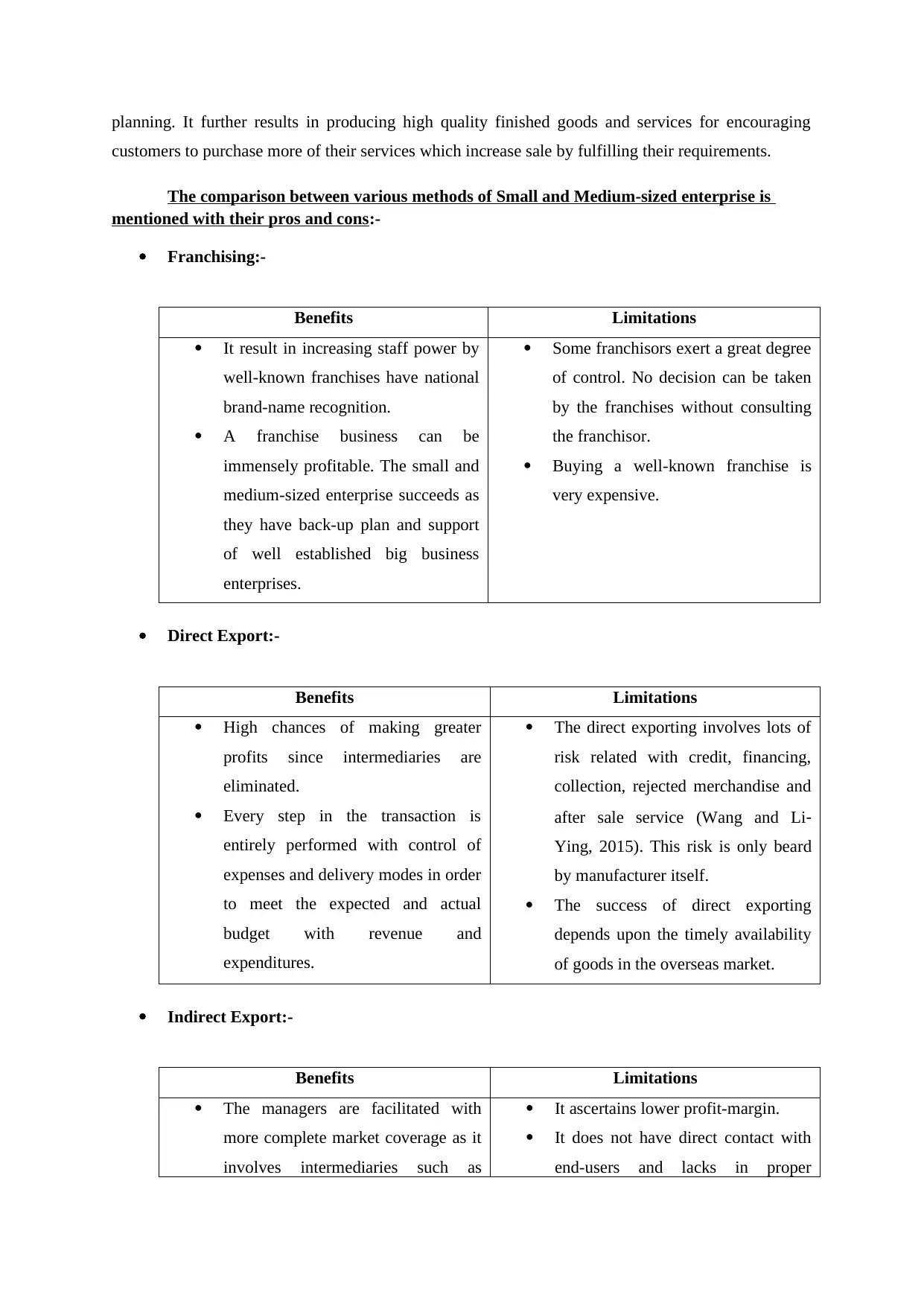
planning. It further results in producing high quality finished goods and services for encouraging
customers to purchase more of their services which increase sale by fulfilling their requirements.
The comparison between various methods of Small and Medium-sized enterprise is
mentioned with their pros and cons:-
Franchising:-
Benefits Limitations
It result in increasing staff power by
well-known franchises have national
brand-name recognition.
A franchise business can be
immensely profitable. The small and
medium-sized enterprise succeeds as
they have back-up plan and support
of well established big business
enterprises.
Some franchisors exert a great degree
of control. No decision can be taken
by the franchises without consulting
the franchisor.
Buying a well-known franchise is
very expensive.
Direct Export:-
Benefits Limitations
High chances of making greater
profits since intermediaries are
eliminated.
Every step in the transaction is
entirely performed with control of
expenses and delivery modes in order
to meet the expected and actual
budget with revenue and
expenditures.
The direct exporting involves lots of
risk related with credit, financing,
collection, rejected merchandise and
after sale service (Wang and Li‐
Ying, 2015). This risk is only beard
by manufacturer itself.
The success of direct exporting
depends upon the timely availability
of goods in the overseas market.
Indirect Export:-
Benefits Limitations
The managers are facilitated with
more complete market coverage as it
involves intermediaries such as
It ascertains lower profit-margin.
It does not have direct contact with
end-users and lacks in proper
customers to purchase more of their services which increase sale by fulfilling their requirements.
The comparison between various methods of Small and Medium-sized enterprise is
mentioned with their pros and cons:-
Franchising:-
Benefits Limitations
It result in increasing staff power by
well-known franchises have national
brand-name recognition.
A franchise business can be
immensely profitable. The small and
medium-sized enterprise succeeds as
they have back-up plan and support
of well established big business
enterprises.
Some franchisors exert a great degree
of control. No decision can be taken
by the franchises without consulting
the franchisor.
Buying a well-known franchise is
very expensive.
Direct Export:-
Benefits Limitations
High chances of making greater
profits since intermediaries are
eliminated.
Every step in the transaction is
entirely performed with control of
expenses and delivery modes in order
to meet the expected and actual
budget with revenue and
expenditures.
The direct exporting involves lots of
risk related with credit, financing,
collection, rejected merchandise and
after sale service (Wang and Li‐
Ying, 2015). This risk is only beard
by manufacturer itself.
The success of direct exporting
depends upon the timely availability
of goods in the overseas market.
Indirect Export:-
Benefits Limitations
The managers are facilitated with
more complete market coverage as it
involves intermediaries such as
It ascertains lower profit-margin.
It does not have direct contact with
end-users and lacks in proper
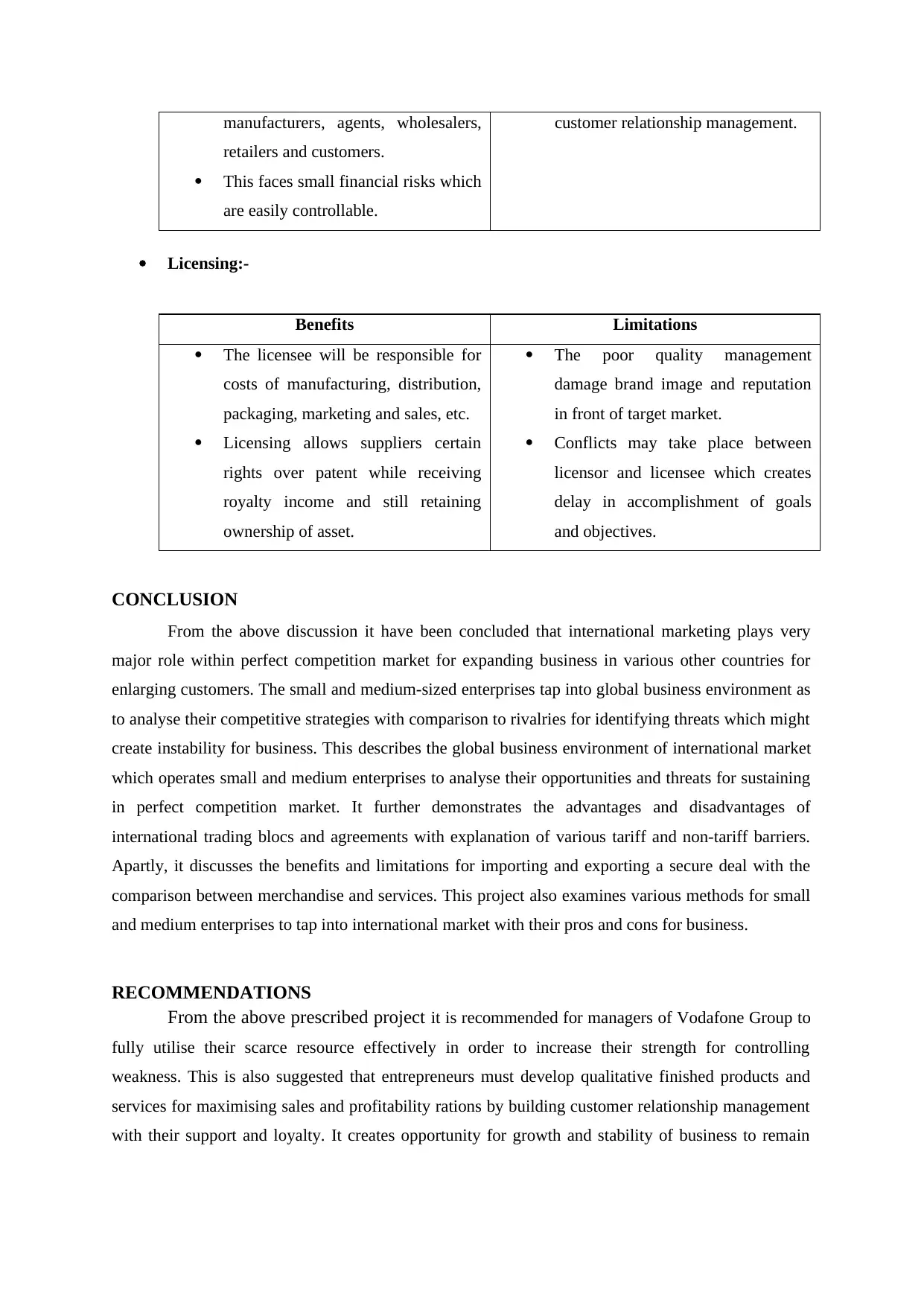
manufacturers, agents, wholesalers,
retailers and customers.
This faces small financial risks which
are easily controllable.
customer relationship management.
Licensing:-
Benefits Limitations
The licensee will be responsible for
costs of manufacturing, distribution,
packaging, marketing and sales, etc.
Licensing allows suppliers certain
rights over patent while receiving
royalty income and still retaining
ownership of asset.
The poor quality management
damage brand image and reputation
in front of target market.
Conflicts may take place between
licensor and licensee which creates
delay in accomplishment of goals
and objectives.
CONCLUSION
From the above discussion it have been concluded that international marketing plays very
major role within perfect competition market for expanding business in various other countries for
enlarging customers. The small and medium-sized enterprises tap into global business environment as
to analyse their competitive strategies with comparison to rivalries for identifying threats which might
create instability for business. This describes the global business environment of international market
which operates small and medium enterprises to analyse their opportunities and threats for sustaining
in perfect competition market. It further demonstrates the advantages and disadvantages of
international trading blocs and agreements with explanation of various tariff and non-tariff barriers.
Apartly, it discusses the benefits and limitations for importing and exporting a secure deal with the
comparison between merchandise and services. This project also examines various methods for small
and medium enterprises to tap into international market with their pros and cons for business.
RECOMMENDATIONS
From the above prescribed project it is recommended for managers of Vodafone Group to
fully utilise their scarce resource effectively in order to increase their strength for controlling
weakness. This is also suggested that entrepreneurs must develop qualitative finished products and
services for maximising sales and profitability rations by building customer relationship management
with their support and loyalty. It creates opportunity for growth and stability of business to remain
retailers and customers.
This faces small financial risks which
are easily controllable.
customer relationship management.
Licensing:-
Benefits Limitations
The licensee will be responsible for
costs of manufacturing, distribution,
packaging, marketing and sales, etc.
Licensing allows suppliers certain
rights over patent while receiving
royalty income and still retaining
ownership of asset.
The poor quality management
damage brand image and reputation
in front of target market.
Conflicts may take place between
licensor and licensee which creates
delay in accomplishment of goals
and objectives.
CONCLUSION
From the above discussion it have been concluded that international marketing plays very
major role within perfect competition market for expanding business in various other countries for
enlarging customers. The small and medium-sized enterprises tap into global business environment as
to analyse their competitive strategies with comparison to rivalries for identifying threats which might
create instability for business. This describes the global business environment of international market
which operates small and medium enterprises to analyse their opportunities and threats for sustaining
in perfect competition market. It further demonstrates the advantages and disadvantages of
international trading blocs and agreements with explanation of various tariff and non-tariff barriers.
Apartly, it discusses the benefits and limitations for importing and exporting a secure deal with the
comparison between merchandise and services. This project also examines various methods for small
and medium enterprises to tap into international market with their pros and cons for business.
RECOMMENDATIONS
From the above prescribed project it is recommended for managers of Vodafone Group to
fully utilise their scarce resource effectively in order to increase their strength for controlling
weakness. This is also suggested that entrepreneurs must develop qualitative finished products and
services for maximising sales and profitability rations by building customer relationship management
with their support and loyalty. It creates opportunity for growth and stability of business to remain
⊘ This is a preview!⊘
Do you want full access?
Subscribe today to unlock all pages.

Trusted by 1+ million students worldwide

stable in global market by developing its competitive strategies for competing with rivalries such as
Airtel, Reliance Jio, etc.
Airtel, Reliance Jio, etc.
Paraphrase This Document
Need a fresh take? Get an instant paraphrase of this document with our AI Paraphraser
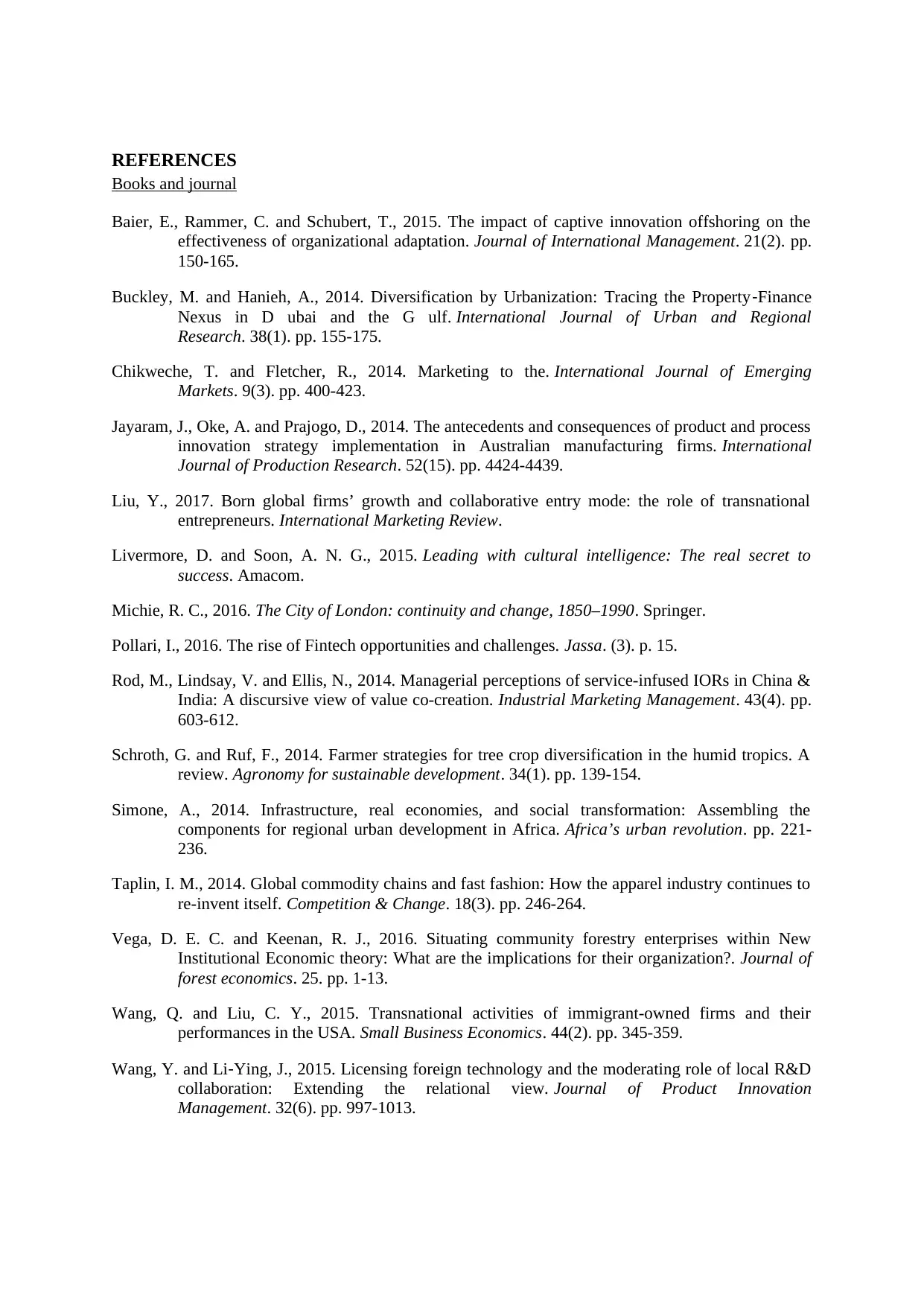
REFERENCES
Books and journal
Baier, E., Rammer, C. and Schubert, T., 2015. The impact of captive innovation offshoring on the
effectiveness of organizational adaptation. Journal of International Management. 21(2). pp.
150-165.
Buckley, M. and Hanieh, A., 2014. Diversification by Urbanization: Tracing the Property‐Finance
Nexus in D ubai and the G ulf. International Journal of Urban and Regional
Research. 38(1). pp. 155-175.
Chikweche, T. and Fletcher, R., 2014. Marketing to the. International Journal of Emerging
Markets. 9(3). pp. 400-423.
Jayaram, J., Oke, A. and Prajogo, D., 2014. The antecedents and consequences of product and process
innovation strategy implementation in Australian manufacturing firms. International
Journal of Production Research. 52(15). pp. 4424-4439.
Liu, Y., 2017. Born global firms’ growth and collaborative entry mode: the role of transnational
entrepreneurs. International Marketing Review.
Livermore, D. and Soon, A. N. G., 2015. Leading with cultural intelligence: The real secret to
success. Amacom.
Michie, R. C., 2016. The City of London: continuity and change, 1850–1990. Springer.
Pollari, I., 2016. The rise of Fintech opportunities and challenges. Jassa. (3). p. 15.
Rod, M., Lindsay, V. and Ellis, N., 2014. Managerial perceptions of service-infused IORs in China &
India: A discursive view of value co-creation. Industrial Marketing Management. 43(4). pp.
603-612.
Schroth, G. and Ruf, F., 2014. Farmer strategies for tree crop diversification in the humid tropics. A
review. Agronomy for sustainable development. 34(1). pp. 139-154.
Simone, A., 2014. Infrastructure, real economies, and social transformation: Assembling the
components for regional urban development in Africa. Africa’s urban revolution. pp. 221-
236.
Taplin, I. M., 2014. Global commodity chains and fast fashion: How the apparel industry continues to
re-invent itself. Competition & Change. 18(3). pp. 246-264.
Vega, D. E. C. and Keenan, R. J., 2016. Situating community forestry enterprises within New
Institutional Economic theory: What are the implications for their organization?. Journal of
forest economics. 25. pp. 1-13.
Wang, Q. and Liu, C. Y., 2015. Transnational activities of immigrant-owned firms and their
performances in the USA. Small Business Economics. 44(2). pp. 345-359.
Wang, Y. and Li‐Ying, J., 2015. Licensing foreign technology and the moderating role of local R&D
collaboration: Extending the relational view. Journal of Product Innovation
Management. 32(6). pp. 997-1013.
Books and journal
Baier, E., Rammer, C. and Schubert, T., 2015. The impact of captive innovation offshoring on the
effectiveness of organizational adaptation. Journal of International Management. 21(2). pp.
150-165.
Buckley, M. and Hanieh, A., 2014. Diversification by Urbanization: Tracing the Property‐Finance
Nexus in D ubai and the G ulf. International Journal of Urban and Regional
Research. 38(1). pp. 155-175.
Chikweche, T. and Fletcher, R., 2014. Marketing to the. International Journal of Emerging
Markets. 9(3). pp. 400-423.
Jayaram, J., Oke, A. and Prajogo, D., 2014. The antecedents and consequences of product and process
innovation strategy implementation in Australian manufacturing firms. International
Journal of Production Research. 52(15). pp. 4424-4439.
Liu, Y., 2017. Born global firms’ growth and collaborative entry mode: the role of transnational
entrepreneurs. International Marketing Review.
Livermore, D. and Soon, A. N. G., 2015. Leading with cultural intelligence: The real secret to
success. Amacom.
Michie, R. C., 2016. The City of London: continuity and change, 1850–1990. Springer.
Pollari, I., 2016. The rise of Fintech opportunities and challenges. Jassa. (3). p. 15.
Rod, M., Lindsay, V. and Ellis, N., 2014. Managerial perceptions of service-infused IORs in China &
India: A discursive view of value co-creation. Industrial Marketing Management. 43(4). pp.
603-612.
Schroth, G. and Ruf, F., 2014. Farmer strategies for tree crop diversification in the humid tropics. A
review. Agronomy for sustainable development. 34(1). pp. 139-154.
Simone, A., 2014. Infrastructure, real economies, and social transformation: Assembling the
components for regional urban development in Africa. Africa’s urban revolution. pp. 221-
236.
Taplin, I. M., 2014. Global commodity chains and fast fashion: How the apparel industry continues to
re-invent itself. Competition & Change. 18(3). pp. 246-264.
Vega, D. E. C. and Keenan, R. J., 2016. Situating community forestry enterprises within New
Institutional Economic theory: What are the implications for their organization?. Journal of
forest economics. 25. pp. 1-13.
Wang, Q. and Liu, C. Y., 2015. Transnational activities of immigrant-owned firms and their
performances in the USA. Small Business Economics. 44(2). pp. 345-359.
Wang, Y. and Li‐Ying, J., 2015. Licensing foreign technology and the moderating role of local R&D
collaboration: Extending the relational view. Journal of Product Innovation
Management. 32(6). pp. 997-1013.
1 out of 14
Related Documents
Your All-in-One AI-Powered Toolkit for Academic Success.
+13062052269
info@desklib.com
Available 24*7 on WhatsApp / Email
![[object Object]](/_next/static/media/star-bottom.7253800d.svg)
Unlock your academic potential
© 2024 | Zucol Services PVT LTD | All rights reserved.



